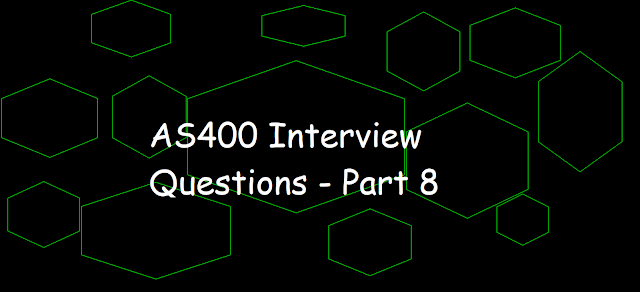 |
| AS400 Interview Questions - Part 8 |
Q1: Which operator extender will be used to prevent files from being locked when we read a file in Update mode?
Answer:
- N(No Lock).
Q2: What is an OPNQRYF in CL?
Answer:
- Creates a Temporary Access path.
- Used to sort records.
- Used to select subset records.
- Used to group records.
Q3: How we can find out the Job name and other Job details in CL?
Answer:
- RTVJOBA
Q4: How can we declare variables and files in CL?
Answer:
- DCL command to declare a variable.
- DCLF command to declare files.
Q5: What are the data types available in CL?
Answer:
- CHAR
- DEC
- BOOLEAN
- POINTER
Q6: If the field is defined in DDS, how is it referenced in a CL program?
Answer:
- FLD1 in FILE will be referenced as &FLD1 in CL program.
Q7: How do we change the value of a particular variable in CL?
Answer:
- CHGVAR
Q8: Define ITER and LEAVE?
Answer:
- LEAVE will be used to exit the loop i.e. jumps to the statement next to ENDDO.
- ITER jumps to ENDDO, to skip any iteration.
- Both are branching statements.
Q9: What are the statements, which is not used in CLLE that is used in CLP?
Answer:
- RCLRSC in CLP/RCLACTGRP in CLLE
- TRFCTL which is used to call program in CLP but its not used now, we use CALL.
Q10: What are the various stages of a Job after it is submitted?
Answer:
- Job queue
- Active
- Out queue
Q11: In ILE, Suppose PGMA that has 2 parameters and calls PGMB that expects 3 parameters from PGMA? How can we handle the problem?
Answer:
- The keyword OPTIONS(*NOPASS) states that the parameter is an optional parameter, which need not be transferred.
Q12: What are JOBQ and PRINTQ?
Answer:
- JOBQ - list of Jobs to be processed.
- PRINTQ - list of spool files to be printed.
Q13: String operation in CL?
Answer:
- %SST
- %SCAN
Q14: What is DSPMSGD?
Answer:
- Used to check the message-id description in MSGF.
Q15: How can you set the lower limit to a file in CL?
Answer:
- POSDBF *START
- OVRDBF(key-value, rrn, *START)
Q16: Which CL command to write to file?
Answer:
- SNDF
Q17: Which CL command is equivalent to Write/Read a display file in RPG?
Answer:
- SNDECVF
Q18: How can we share the access path?
Answer:
- Use OPNQRYF to create an open data path(access path).
- Use the OVRDBF command with SHARE(*YES) before calling the program.
Q19: Difference between Logical file and OPNQRYF?
Answer:
- Both are access paths, however, LF is permanent and OPNQRYF creates a temporary access path.
- If data is static go with LF, If data is dynamic go with OPNQRYF to increase system performance.
Q20: What does the RETURN command do in CL?
Answer:
- Return to the caller.
Related Post
AS400 Interview Questions - Part 1
AS400 Interview Questions - Part 2
AS400 Interview Questions - Part 3
AS400 Interview Questions - Part 4
AS400 Interview Questions - Part 5
AS400 Interview Questions - Part 6
AS400 Interview Questions - Part 7
AS400 Interview Questions - Part 9
AS400 Interview Questions - Part 10
AS400 Interview Questions - Part 11
AS400 Interview Questions - Part 12
As400 Interview Questions - Part 13
AS400 Interview Questions (DB2) - Part 1
AS400 Interview Questions (DB2) - Part 2